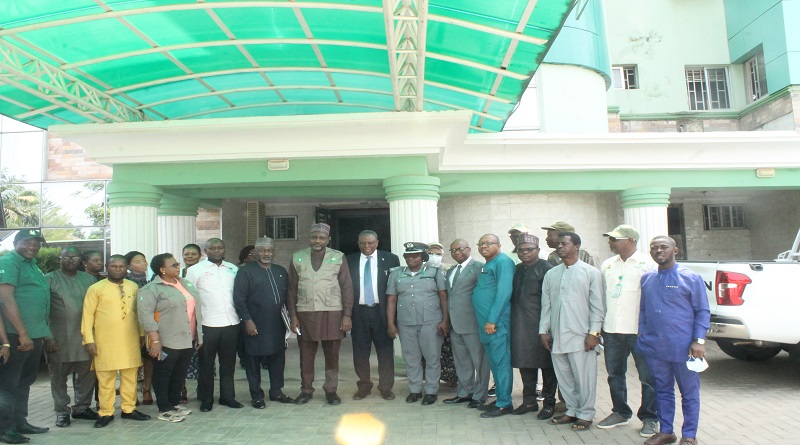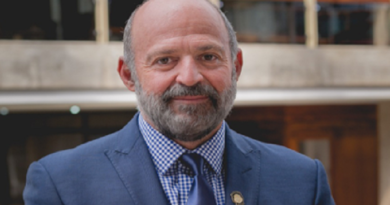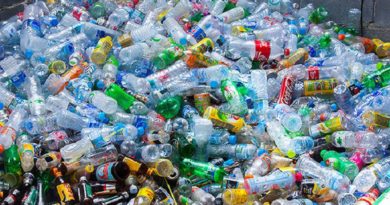Stakeholders want expansion of plastic waste control, new regulations
Photo caption: Participants in a group photograph during the stakeholders workshop on strengthening National Advocacy for the Transposition and Domestication of the Basel Convention Amendment in Nigeria held in Abuja on Thursday 27th January 2022.
Stakeholders in the environment sector have stressed the need to expand the plastic waste control to incorporate the global trend towards circular economy to ensure sustainability. Besides, they also called for domestication of Basel Convention as well as the Amendment by the Federal Ministry of Environment.
The calls were made in a communique issued at the end of a day long first meeting of stakeholders on Strengthening National Advocacy for the Transposition and Domestication of the Basel Convention Amendment (Plastic Waste Regulations) in Nigeria, held in Abuja on Thursday, 27th January, 2022.
The workshop was initiated by the Sustainable Research and Action for Environmental Development (SRADeV) in collaboration with the National Environmental Standards and Regulations Enforcement Agency (NESREA) with the objective to strengthen the legal framework for environmental sound management of plastics from cradle to cradle and it was presided over by Prof. Aliyu Jauro, Director General/CEO, NESREA.
Participants at the workshop also stressed the need to develop a separate national environmental regulations on plastic waste by NESREA; Standard Organisation of Nigeria (SON) to set contamination limits for plastic waste and consider the range of 0.5-2%; the regulations should reflect the new amendments to the BC and the peculiarities of our country; and relevant MDAs should work with NESREA as the enforcement Agency of the FMEnv to achieve this goal.
Besides, they approved that NESREA should work with Stakeholders to immediately kick start the activities outlined to control plastic pollution in line with the tenets of circular economy even as they encouraged SRADev to continue in its quest to ensure environmental sound management and control of plastic waste.
Participants observed that the challenges of plastic waste management due to its non-biodegradable nature and on-going efforts made in the management of other waste streams including plastics from cradle- to cradle.
Essentially, it was noted that the various national policies on plastic waste management (National Policy on Solid Waste Management 2018, National Policy on Plastic Lifecycle Management 2020 and applicable National Environmental Regulations; Nigeria is a signatory to the Basel Convention (BC) on the Transboundary Movement of Hazardous Waste and their Disposal, which is a comprehensive tool to manage importation of plastic waste; the Conference of the Parties to the BC adopted two important decisions to address plastic waste in 2019 that led to amendment of Annexes II, VIII and IX to the Convention in relation to plastic waste; the specific objectives to the adopted amendments to the Annexes was to enhance the control of the transboundary movements of plastic waste and clarify the scope of the Convention as it applies to such waste; the new entries became effective as at 1st January, 2021 requiring that it is transposed into our national laws since Nigeria is a signatory to the BC; and this offers an ample opportunity to review existing regulations focused on domestic consumption and production of plastics and also put stringent requirements to deter importation of plastic waste was into the country;
Director General of NESREA, Prof. Aliyu Jauro, in his welcome remarks said plastics has contributed to the world technological advancement but today, its environmental sound management from cradle – to – cradle has become a global challenge due to its non-biodegradable nature. This, he said, is the enabler for shipment of plastic waste around the world now exacerbated by the collapse of global recycling markets. Often times, these plastics wastes are rather dumped in recipient countries than recycled as originally intended.
He explained that the Basel Convention (BC) on the Control of Transboundary Movement of Hazardous Wastes and their Disposal which came into force in 1992 is the most comprehensive and effective global instrument for management and control of hazardous wastes. In order to address the threat posed by plastics to human health and the environment, the Conference of the Parties to the BC adopted two important decisions to address plastic waste in 2019, thus strengthening it as the only legally binding instrument to specifically address plastic waste.
“These new entries became effective as at 1st January, 2021 requiring that it is transposed into our national laws since Nigeria is a signatory to the BC. This offers an ample opportunity to review existing laws focused on domestic consumption and production of plastics and also put stringent requirements to deter importation of plastic waste”, he stressed.
In his presentation on the “Role of stakeholders in plastic waste management in relation to the Basel Convention Amendment in Nigeria” Prof. Babajide Alo, said awareness, readiness and action appears to be poor and lacking among stakeholders in Nigeria.
He went further, “Nigeria can take the opportunity provided by the transposition process to pass comprehensive legislation that prevents plastic waste at source or prevent the country from becoming a dumping ground for plastic waste from developed countries as was the case with e-waste!”.
Executive Director SRADev, commended NESREA for her active role in waste management in Nigeria. He particularly commended the DG for repositioning the organization into a great level within a short time.
The workshop was attended by representatives of various Ministries Departments and Agencies including the Federal Ministry of Environment (FMEnv), Federal Ministry of Justice (FMOJ), Standards Organization of Nigeria (SON), Non-Governmental Organizations (NGOs), Members of Armed Forces and other Para-Military Agencies, members of the Organized Private Sector (OPS) and a host of other stakeholders.




